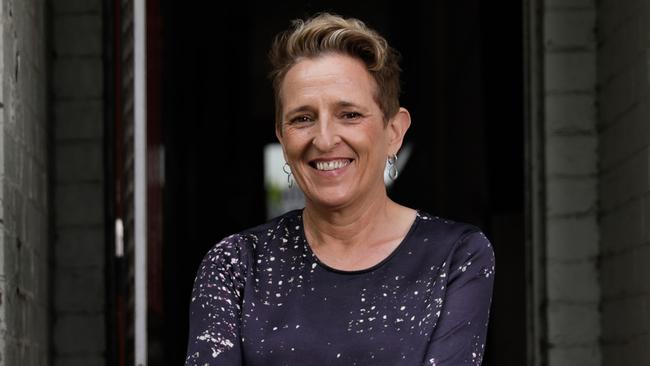Charlotte Wood on ‘nourishing the inner life’ and the trouble with being relatable
Leading novelist Charlotte Wood calls out ‘infantilising’ literary trends in her essay collection, which was inspired by Covid-19.

Charlotte Wood is one of our leading authors, yet she admits the long, arduous process of writing a novel can resemble Patrick White’s famously graphic description: something “dragged out, by tongs, a bloody mess, in the small hours”.
During a Zoom interview, I ask the Stella Prize-winning author which of her nine fiction and non-fiction books got to the “bloody mess” stage.
She replies that she has struggled with all of her manuscripts, but “the one that was really tough and sent me a bit crazy was The Natural Way of Things, because of the darkness of the material that I was continually trying to resist.”
Published in 2015, The Natural Way of Things is a surreal yet intensely vivid novel in which 10 women – all of whom have been damaged by sexual scandals with powerful men – are incarcerated on a remote and brutal prison farm.
While writing her dystopian tale, Wood says she constantly asked herself whether she was inadvertently trafficking in the violence and misogyny she had set out to condemn.
“That’s one of the things that made it hard to write,’’ she explains. “I was continually thinking, ‘What does that say about me? That I’m writing this very dark stuff, but entering into a sort of hatefulness towards women? Am I just adding more hatefulness towards women and the world?’”
Ironically, the novel Wood wrestled with the most, turned out to be her most acclaimed work: The Natural Way of Things took out the 2016 Stella Prize, the Indie Book of the Year and Novel of the Year, and was joint winner of the Prime Minister’s Literary Award for Fiction.
Described by The Economist as “a haunting parable of contemporary misogyny’’, and included in The Guardian’s best books of 2016 list, it pre-dated the #MeToo movement but seemed to presage it.
Despite her success, Wood tells Review she was deeply offended when another writer declared “she wouldn’t read the novel because she disapproved of trading in violence”. “That really shocked me, that a writer would say that to a fellow writer, ‘I’m not going to read your book but will denounce it.’
“That really got to me, that suggestion that I had thought, ‘Ooh I’ll get some notoriety or some money (by writing about sexual violence). I’ve always tried to be sincere in what I’m doing. It’s personal to every woman, that sort of stuff, so I found that hard going.’’ The Sydney author is ultimately philosophical about this encounter, given how “I had such an incredible response to that book and it really changed my life”. Still, she says the current trend whereby people denounce books they haven’t read is “depressing”.
Wood details her struggle to write in an ethical way about sexual violence in The Luminous Solution, her new, eclectic collection of essays, speeches and articles that was inspired by her initial, panicky response to the Covid-19 pandemic.
Elegant and deeply considered, the collection comprises new essays as well as previously-published pieces she has reworked or updated, including the pithily titled “Reading isn’t shopping” – her protest against the notion that fiction should be “uplifting” and “relatable”.
The Luminous Solution is partly a meditation on Wood’s “creative impulse” – the title comes from a quote by US writer Janet Burroway, who said that during a writer’s “grumpy struggle” over a manuscript, “luminous solutions” can suddenly appear “in bed or bath”.
Wood’s book offers surprising insights into what she has learned about the alternately tortuous and pleasurable art of writing fiction over her 30-year career.
There are the afternoon power naps that can resolve episodes of inertia and revelations about how she replaced her bouts of anxiety over a challenging writing project with a more productive “curious optimism”.
As she speaks over Zoom, Wood sits in her study in her inner Sydney home during the city’s second lockdown, a wall of white bookshelves, including a small LP collection, at her back. A slight figure in a tall office chair, her face is framed by large tortoiseshell glasses and her manner is both approachable and thoughtful, intense yet measured.
Her last novel, The Weekend, was about three older women whose lifelong bonds start to fray after a fourth friend dies. Published in 2019, it won the book of the year prize for literary fiction at the Australian Book Industry Awards and was short-listed for several other prizes.
Given that she is on a roll with her fiction, why has Wood now written her third non-fiction book? She says a strong reader response to an essay called Fertile Ground, in which she wrote about the “disarray” and “panic” she felt during the first wave of the Covid-19 pandemic, was the spark for The Luminous Solution.
“So many people contacted me after reading it, to say it had echoed their own experience, that I began to think the time might be right for a book like this,’’ she writes.
After all, in our strange, strained time of Covid-19 and its unpredictable variants, we are “suddenly aware of how little control we really have over our lives”, so a work focused on building resilience through “nourishing the inner life” took on a new urgency.
She submitted the manuscript earlier this year when Covid’s first wave had all but petered out in NSW, and wondered whether her Fertile Ground essay would still be relevant. “And whammo, here we are again!’’ she says ruefully of being in lockdown a second time. “I have found it harder this time, obviously because it’s a longer lockdown than we had before in Sydney. And I know people with much more distressing circumstances.
“My husband and I are fine, although my concentration is shot in a way I’ve been a bit surprised by.”
The writer, who is in her mid-50s and doesn’t have kids, feels “very fortunate” she is not having to homeschool children or watch elderly parents die alone in hospital. She adds: “I’m not freaked out any more. I get bored and stir crazy, but I don’t get that panic we all had in the early months. It was so terrifying; we didn’t know what was going to happen.’’
Her new book takes aim at trends in literary culture that irk her, including an “infantilising” tendency to focus entirely on the social issues raised by a novel or on a writer’s backstory, rather than the quality of the writing. She found that when she gave talks on The Weekend, the discussion was never about her characters, symbolism, or story arc but always about ageing. And while The Natural Way of Things explores themes of otherworldliness, beauty and the natural world, media interviews focused almost solely on the misogyny her characters had suffered.
“It’s almost like we need an issue to hang a book on,” she says. “The use of language is almost never mentioned. In all the talking that we do – and we do so much talking about writing – what a good sentence does is almost of no interest.” Yet the aesthetic qualities of fiction are of interest to readers, she argues (her book includes a discussion about how to write a decent sentence).
A related tyranny is the notion that fiction and fictional characters need to be “relatable”, leaving little room for deeply flawed or unlikeable figures, or books that are disorientating and difficult. We are in danger of reinventing “reading as therapy”, she warns.
“Most writers I know roll their eyes and groan when the word relatable is used,” she says. “I really like people who are a bit spiky and forthright and who aren’t pandering for your approval. I do think there’s this weird moralising about fictional characters’ behaviour that happens now.”
She says she was accused of creating unlikeable characters in The Weekend, including a 70-something woman, Jude, who has been in a long-term affair with a married man. “You can think what you like about that …” she says, pausing for comic effect: “ … But this person isn’t real.”
The Luminous Solution is dedicated to the late author Georgia Blain, a close friend of Wood’s who tragically died from brain cancer in 2016, aged 51. The collection includes an interview Wood conducted with her friend after her devastating diagnosis of incurable cancer.
She says she shaped her interview to focus not just on Blain’s illness, but on her final adult novel, Between A Wolf and a Dog, a family saga which was posthumously awarded a Victorian Premier’s literary prize in 2017. Blain cheerfully volunteers that she, too, was often “slammed for having unlikeable characters”. As she became more and more frail from the side effects of chemotherapy, she was determined to keep writing but told Wood: “I’m grasping the possibility now that I might be this sick until the day I die.”
Wood says she and Blain “sort of grew up as writers around the same time … We became much closer in the few years before she got sick. By the time she died, we were pretty good friends. She is so missed. Everyone misses her so much.”
In another essay, On Gods and Ghosts, Wood writes about her Catholic upbringing in the NSW country town, Cooma, as a “wellspring” for her art. One of five children, she attended mass every Sunday until she turned 18. She was often bored in church and, from an early age, had clocked the double standards imposed on women in the Bible and the Catholic Church hierarchy. Nevertheless, she felt “nurtured and secretly enthralled by the Bible, the mass, the stories of the saints. I loved the lushness, the supernatural weirdness of the visions and miracles.”
Now an atheist, she acknowledges how unfashionable it is to be a Christian in contemporary writing circles. “I’m an atheist but I’m not a fundamental atheist,” she says, chuckling softly.
“I don’t believe in god but I don’t despise people who do. There is a kind of fundamentalism about atheism that wouldn’t be tolerated in religion but it’s tolerated within atheism. I just find it boring. It’s not interesting to go around laughing at Christians … I find it quite childish, sometimes, the ridiculing of people’s religion.”
Her next novel, she reveals, is about women who become nuns and why they make this choice in the 21st century; she is primarily interested in “their withdrawal from normal society; that decision to step away from the ordinary capitalist world. I’m really interested in that idea of retreat or monastic life.”
As she writes, she is trying to resolve how “I can despise all the misogyny of the Catholic Church and the utter amorality of the way it dealt with institutional sexual abuse. At the same time there are these (Catholic) people doing incredible things.” Through religion, she also absorbed “an openness to an imaginative world and that sense of the uncanny that has meant so much to me.”
As always, the writing of such nuanced material doesn’t come easily: “I feel like I’ve had about five false starts on this one,” she confesses – and Covid hasn’t helped.
“That could be a massive excuse, which writers are good at making,” she quips.
While she hopes her essay collection will be a conversation starter for other artists, she feels “a rich inner life” should be open to everyone. She notes how people crave the stillness that can lead to greater introspection, but also fear it. “Artists do too,” she says. “There’s a rich vein of humour in the art world about procrastinators doing everything but the work itself; procasti-baking, all that sort of stuff. I’m always looking for a new way of working because I’m very easily bored.” She concedes, with a self-deprecating grin: “That is not a great attribute for a writer.”
The Luminous Solution, by Charlotte Wood, Allen & Unwin, $32.99, is out now.




To join the conversation, please log in. Don't have an account? Register
Join the conversation, you are commenting as Logout